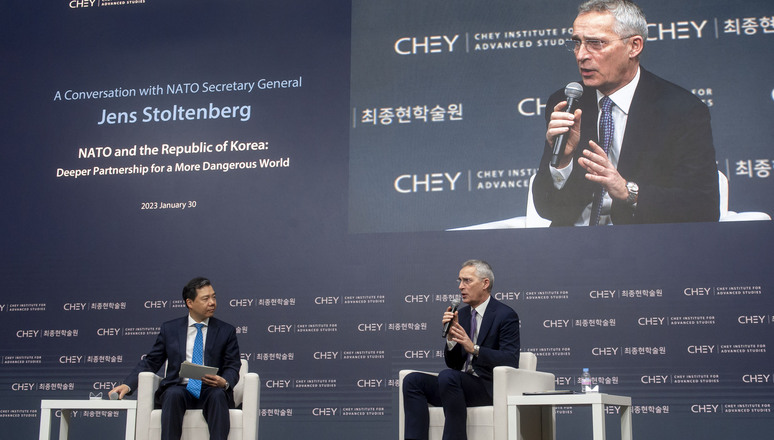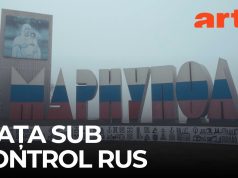Secretarul General al NATO, Jens Stoltenberg, a cerut luni Coreei de Sud să sporească sprijinul militar acordat Kievului, dând exemplul altor ţări care şi-au schimbat politica de a nu furniza arme ţărilor aflate în conflict, după invazia rusă în Ucraina, informează Reuters.
Stoltenberg se află la Seul, prima oprire a unei călătorii care mai include Japonia şi are ca scop consolidarea legăturilor cu aliaţii SUA în faţa războiului din Ucraina şi a concurenţei în creştere din partea Chinei.
În întâlnirile cu înalţi oficiali sud-coreeni, secretarul general al NATO a susţinut că evenimentele din Europa şi America de Nord sunt interconectate cu alte regiuni şi că alianţa doreşte
să contribuie la gestionarea ameninţărilor globale prin creşterea parteneriatelor în Asia.
Într-un discurs la Institutul Chey pentru Studii Avansate din Seul, el a mulţumit Coreei de Sud pentru ajutorul neletal acordat Ucrainei, dar i-a cerut să facă mai mult, adăugând că este o “nevoie urgentă” de muniţie.
“Îndemn Republica Coreea să continue şi să intensifice chestiunea specifică a sprijinului militar”, a spus secretarul general al Alianţei Nord-Atlantice.
De la începutul războiului, Coreea de Sud a semnat acorduri majore prin care a furnizat sute de tancuri, avioane şi alte arme Poloniei, dar preşedintele sud-coreean Yoon Suk-yeol a spus că legea ţării sale, care interzice furnizarea de arme ţărilor aflate în conflicte, face dificilă furnizarea de arme Ucrainei.
Stoltenberg a remarcat că ţări precum Germania, Suedia şi Norvegia au avut politici similare, dar le-au schimbat.”Dacă nu vrem ca autocraţia şi tirania să câştige, atunci (ucrainenii) au nevoie de arme, aceasta este realitatea”, a spus el.
Într-un comunicat dat publicităţii luni, regimul nord-coreean a numit vizita lui Stoltenberg un “preludiu al confruntării şi războiului, deoarece aduce norii întunecaţi ai unui ‘nou război rece’ în regiunea Asia-Pacific”.
Anul trecut, Coreea de Sud şi-a deschis prima sa misiune diplomatică pe lângă NATO, angajându-se să aprofundeze cooperarea în domeniul neproliferării, apărării cibernetice, combaterii terorismului, răspunsului la dezastre şi în alte domenii de securitate.
Şeful Pentagonului, Lloyd Austin, este aşteptat luni la Seul pentru discuţii cu omologul său sud-coreean, Lee Jong-Sup, scrie Agerpres.
Speaking on Monday (30 January 2023) at the CHEY Institute for Advanced Studies in Seoul, NATO Secretary General Jens Stoltenberg emphasised that ”what happens in Europe matters to the Indo-Pacific, and what happens in Asia matters to NATO. Our security is connected”.
Jens Stoltenberg :
Thank you for the introduction, Ambassador Park. And for hosting us here at the CHEY Institute for Advanced Studies.
It is a great honour to be here together with you this morning.
It is also great to be back in Seoul, and engage with all of you.
My last visit to the Republic of Korea was in 2017. And since then, your country’s partnership with NATO has grown even stronger.
For years, we have cooperated on issues ranging from counter-terrorism to counter-piracy. And going forward, we can do more together – NATO and the Republic of Korea.
Including to strengthen our effort on global arms control, address disarmament and non-proliferation, work on new technologies, enhance our cyber defences, and uphold the rules-based international order.
I welcome the fact that South Korea established a dedicated diplomatic mission to NATO last November.
And last June, I was honoured to welcome President Yoon to our NATO Summit in Madrid. It was the first time ever he and other leaders from the Indo-Pacific partners of NATO – Australia, Japan and New Zealand – participated together in a NATO summit. A real testimony to our growing ties.
We may be oceans apart, but our security is closely connected.
This has been the case for decades.
Events in this region have shaped NATO as we know it today.
The Korean War broke out just one year after the Alliance was founded in 1949. It made our members realise the need to bolster our defensive power.
As a result of the Korean War, we transformed the North Atlantic Treaty into the North Atlantic Treaty Organisation. Literally putting an “O” into “NATO”.
This involved creating the position of the Secretary General. Standing up a permanent military headquarters. And appointing a Supreme Allied Commander in Europe.
So NATO’s history and our security has long been connected with yours. And today, we continue to share strategic interests and concerns.
The threat posed by North Korea is one of them.
North Korea continues its pattern of provocative and destabilising behaviour, including unprecedented missile tests over the past year, as well as continued nuclear activity and rhetoric.
All in contravention of UN Security Council Resolutions.
This poses a clear and present danger to the Republic of Korea, to the wider region, and to international peace and security.
We stand with our partners in calling on Pyongyang to stop its provocations, and comply fully with international law.
North Korea has also delivered rockets and missiles to the Russian Wagner Group. Further fuelling Russia’s war of aggression against Ukraine.
President Putin launched his war almost one year ago. To take control of the country and take away people’s freedom.
In response, NATO and NATO Allies and our partners around the world, including South Korea, have condemned this illegal and unjustifiable war. And we have been providing Ukraine unprecedented assistance.
Our support is making a real difference for the Ukrainians. Helping them not only to survive, but also to push back the Russian invader, and liberate their territory.
We must keep supporting Ukraine, for as long as it takes. Because if President Putin wins, the message to him and other authoritarian leaders will be that they can get what they want through the use of force.
This would make the world more dangerous, and us more vulnerable.
So what happens in Europe matters to the Indo-Pacific. And what happens here in Asia matters to NATO.
Our security is connected.
So we must remain united and firm, insist on full respect for the UN Charter, and ensure oppression and tyranny do not prevail over freedom and democracy.
You can count on NATO to stand with the Republic of Korea, and other like-minded partners to promote peace, protect our shared security, and preserve a global system based on norms and values.
Thank you and then I am ready to engage in a conversation with you.
Thank you so much.




